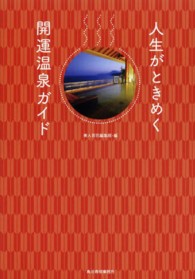- ホーム
- > 洋書
- > 英文書
- > History / World
Full Description
Who owns the past and the objects that physically connect us to history? And who has the right to decide this ownership, particularly when the objects are sacred or, in the case of skeletal remains, human? Is it the museums that care for the objects or the communities whose ancestors made them? These questions are at the heart of Plundered Skulls and Stolen Spirits, an unflinching insider account by a leading curator who has spent years learning how to balance these controversial considerations.
Five decades ago, Native American leaders launched a crusade to force museums to return their sacred objects and allow them to rebury their kin. Today, hundreds of tribes use the Native American Graves Protection and Repatriation Act to help them recover their looted heritage from museums across the country. As senior curator of anthropology at the Denver Museum of Nature & Science, Chip Colwell has navigated firsthand the questions of how to weigh the religious freedom of Native Americans against the academic freedom of scientists and whether the emptying of museum shelves elevates human rights or destroys a common heritage. This book offers his personal account of the process of repatriation, following the trail of four objects as they were created, collected, and ultimately returned to their sources: a sculpture that is a living god, the scalp of a massacre victim, a ceremonial blanket, and a skeleton from a tribe considered by some to be extinct. These specific stories reveal a dramatic process that involves not merely obeying the law, but negotiating the blurry lines between identity and morality, spirituality and politics.
Things, like people, have biographies. Repatriation, Colwell argues, is a difficult but vitally important way for museums and tribes to acknowledge that fact--and heal the wounds of the past while creating a respectful approach to caring for these rich artifacts of history.







